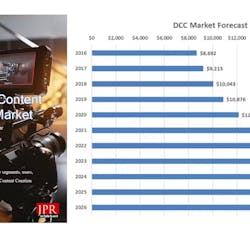Under the new FCC leased access rules, cable operators must set aside channel capacity for commercial use by unaffiliated video programmers.
The Report and Order vacates the "burdensome requirements" in the 2008 Leased Access Order. It also streamlines existing leased access rules and eliminates the requirement that cable operators make leased access available on a part-time basis. Additionally, it modifies the rules so that cable operators, regardless of system size, only have to respond to bona fide requests from prospective leased access programmers.
A Second Further Notice of Proposed Rulemaking asks for comment on simplifying the leased access rate formula so that rates are specific to the tier on which the programming is carried.
FCC Chairman Ajit Pai called the current leased access regime the Betamax or New Coke of FCC regulation, in a cultural reference to the early 80s when the rules went into effect. Back then, when consumers had access to only a few broadcast stations and a single cable operator, leased access was intended to give independent programmers a unique opportunity.
"Today, programmers can and do create and share all sorts of video content online to a worldwide audience. More outlets exist to distribute programming than ever before. And content creators can even distribute their own programming," Pai said. "It's long past time to sync our leased access rules with the times."
Of the report and order, and proposed rulemaking, Pai said, "This is real progress, even against the backdrop of serious concerns that have been raised - concerns I share - about the constitutionality of this entire regime."
Those concerns were expressed by FCC Commissioner Jessica Rosenworcel, who said that the decision "fundamentally interprets the First Amendment values that support our leased access rules."
Rosenworcel explained that the leased access rules encourage civic participation by increasing the number of speakers heard and the variety of viewpoints.
"The proper inquiry then, is not simply whether corporations providing channel capacity have First Amendment rights, but whether this law abridges expression that the First Amendment was meant to protect," Rosenworcel said.
The industry was quick to respond to the FCC's actions. The NCTA, for example, applauded the decision to modernize the rules and to recognize that increased constitutional security is warranted. "We encourage the commission to continue finding ways to clear away dated regulatory underbrush in today's dynamic marketplace."





